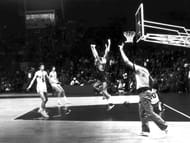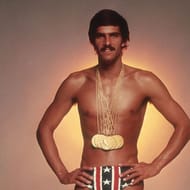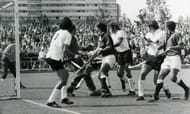Following the partial success of the Mexico City Olympics, the Games came to Munich in 1972. For the first time since Berlin in 1936, the German region had the opportunity to host the quadrennial event.
Like the Tokyo Olympics, these Games were touted to be friendly ones. However, to the horror of both the athletes and the organizers, it turned out to be the exact opposite. Munich Olympics is always one of the darkest episodes in the history of Olympic Games.
But Munich was not all gloom and gory. The 1972 Olympics also had moments of epic glory as well. The 1972 Games saw the rise of Mark Spitz, an American swimmer, who won a record seven Olympic gold medals in one go. This was the highest number of Olympic gold medals won by one individual, until Michael Phelps broke the record in 2008 at Beijing with eight gold medals.
The Munich Olympics also created a unique legacy in hockey. We saw families living up to the reputation of their predecessors when Ashok Kumar, Ajit Pal Singh and Harmik Singh maintained the legacy of their families by helping India to a podium finish.
Here are some more interesting facts about the Munich Games of 1972.
The most controversial Games ever

The Olympics have an icon, they have their own symbol. However, for the first time, at the Munich Olympics, the Games had their own mascot as well. A German daschund named Waldi became the first ever official Olympic mascot. Before Waldi, Smoky was an attempt from the USA in 1932. However, nobody paid attention to it.
Undoubtedly, the Munich Olympics aimed to be a friendly event like the Tokyo edition of 1964. However, it turned out to be the exact opposite. From the 'Black September' attack, to the Germanic rivalry, sportsmanship was reduced to smithereens.
To make matters worse, when Israeli athletes were taken hostage and brutally murdered by the Palestinian terrorists, many called for the Games to be called off. Even if the Olympics cannot be called off, at least a day of mourning or a memorial service was requested to be held. However, the IOC president, Avery Brundage, had none of it, denying both the requests.
Unfortunately, this decision proved extremely disastrous. Avery Brundage was notorious for his prejudice. Even during the Berlin Olympics, he was infamous for his decision to remove two Jewish athletes at the last minute from the relay squad and replace them with Jesse Owens and Ralph Metcalfe. Unfortunately, the Munich episode proved disastrous, and Avery Brundage had to resign in absolute disgrace.
When the USA refused to accept their medals

The Munich Games are also remembered for the USA's refusal to accept their medals. America have been the supreme powerhouse in men's basketball. Ever since the sport was discovered in early 1890s, and ever since it was introduced in 1936, the USA have won 15 of the 18 tournaments they participated in.
From the Berlin Games in 1936, to the Mexico Olympics in 1968, USA were the undisputed champions. However, like India's victory chariot in hockey was brought to a halt by Pakistan at the Rome Olympics, America were defeated by the Soviet Union.
But while Pakistan fought in a surprisingly fair manner and defeated India with a solitary goal, the Soviet Union won the gold medal in a rather controversial manner. USA were leading for most of the match when the score mysteriously turned to 51-50 in the dying minutes of the match. The Americans protested, but to no avail. Furious Americans boycotted the medal ceremony, refusing to accept their silver medals altogether. Even today, they have not accepted their medals at all.
Lasse Viren - A successor to Finland's 'Flying Finns'

The Munich Olympics also brought forward a new champion, Lasse Viren. It had been years since Finland had produced a new Olympic champion. The last time anyone had come close to winning a gold medal in Olympic athletics was Pauli Nevala. However, he did that in the men's javelin throw.
At the Munich Games, it was different. The rise of Paavo Nurmi and Ville Ritola had given Finland hope in long distance running. But it was in Munich, when a runner rejuvenated those hopes for Finland. His name was Lasse Viren. He surprised many by winning a gold medal in 5000m. Despite falling on the 12th lap, Viren set a new world record to win the gold medal for 10000m.
However, Laase Viren was not content with it. Like Paavo Nurmi, he repeated the feat in Montreal in 1976. Unfortunately, he finished fifth in the marathon. Otherwise, he could have emulated the record of Czech stalwart Emil Zatopek, who had won the 5000m, the 10000m and the marathon.
The legend of Mark Spitz

If the Berlin Olympics were well known for the rise of Jesse Owens, Munich edition was well known for the rise of Mark Spitz. He already held 10 world records by 1968. He went on to claim that he would win six Olympic gold medals. However, he won two gold medals, one silver and one bronze medal.
But by the Munich Games, Spitz had changed a lot. He was no longer the brash swimmer. He was calm and much more mature. However, he had no idea that he would do even better.
Mark Spitz set a new world record in each of the seven events he won – 100m freestyle, 200m freestyle, 100m butterfly, 200m butterfly, 4×100me freestyle relay, 4×200m freestyle relay, and 4×100m medley relay.
Mark Spitz was originally reluctant to swim the 100m freestyle, afraid that he would not win the gold medal. However, he won by half a stroke in a world-record time of 51.22 seconds.
Interestingly, Spitz was also touted as one of the prime targets of the 'Black September' group. This was because he was a Jew as well. After he had completed his events, Spitz left Munich early as a result of the Munich Massacre. He was escorted to London for his own safety. It is believed he was escorted out of the country by US Marines stationed in West Germany.
A shameful day in world hockey

If the USA had suffered a shock loss in basketball, Pakistan would have suffered one too. For the first time since 1920, no Asian nation won the Olympic title in field hockey. However, Pakistan showed their displeasure in a way that would make even the English fans who created the mayhem after Euro 2020 look civilized.
We're not making this up. Following the events of the Mexico Olympics and the inaugural Hockey World Cup, Pakistan were well prepared. They even faced their arch rivals, India, in the semi-finals. Unfortunately, it just wasn't the day for the 'Men in Blue'.
Their best men were sitting on the bench, and despite having Olympic gold medalist KD Singh 'Babu' as the coach, India lost the semi-finals. Once again, India had to settle for the bronze medal, though one member, Ashok Kumar Singh, maintained his family's legacy. He was the first hockey player to win an Olympic medal as the son of the illustrious Dhyan Chand.
However, the limelight was stolen by Pakistan's attitude in the finals. They played the hosts, West Germany. The match was intense, and in the dying minutes of extra-time, West Germany scored the golden goal. However, Pakistanis refused to accept it. What follows is a classic example of how not to make a mockery of yourself on the international stage.
The Pakistani team accused the officials of being partial. They had tried the same tactics as India in Tokyo. However, Indians have responded in the same aggressive fashion. When the Germans refused to hear the Pakistani rants, they destroyed the locker room. However, they weren't done yet. When the victory ceremony began, Pakistani players refused to shake hands with the officials. They deliberately wore the silver medals on their feet, and showed their backs to the German flag as their anthem played. This was a shameful day for world hockey.
Following the incident, the International Hockey Federation slapped a lifetime ban on all players. However, diplomatic overtures from Pakistani officials overturned the ban to a maximum of two years. As a result, some players even played at the Montreal Olympics in 1976.
